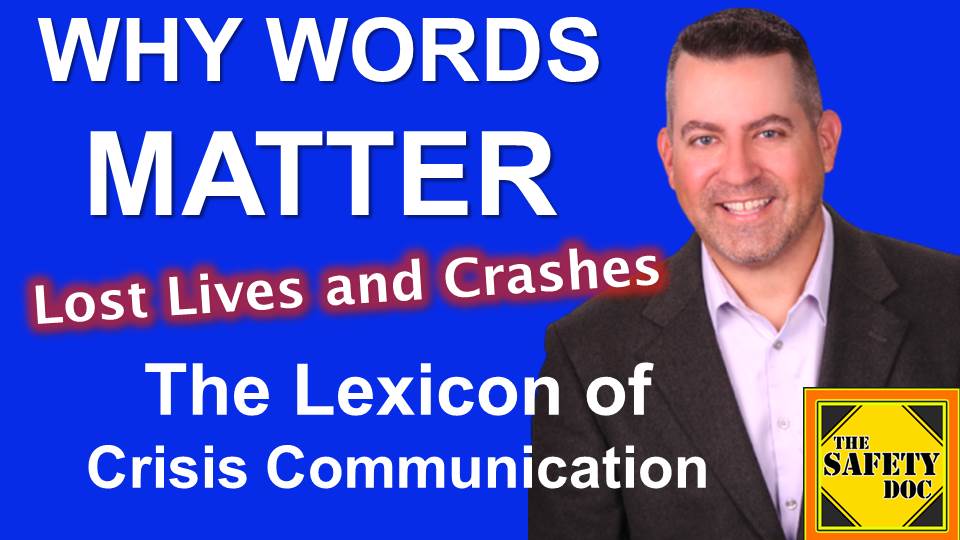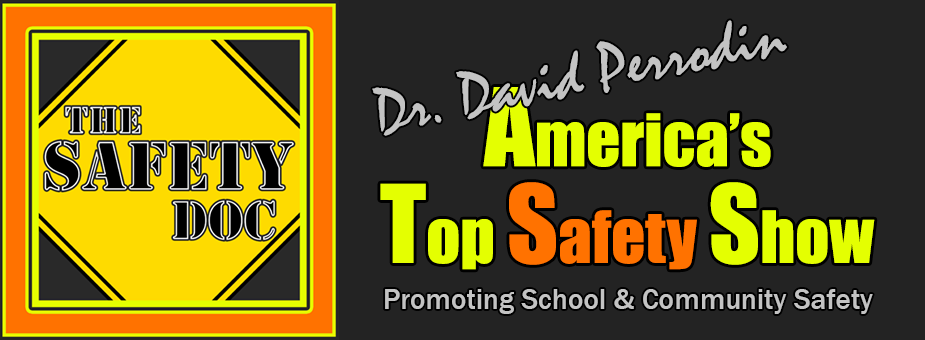Why Words Matter | The Lexicon of Crisis Communication | Lost Lives and Crashes | SDP160
[Podcast] As Doc was writing School of Errors – Rethinking School Safety in America, he talked with parents of children killed or maimed by school shooters. Writing a book about school safety and taking on a multi-billion dollar industry needed to be done in a way that didn’t encroach on the dignity of those killed in acts of school violence or upon that of survivors and family. From those discussions and through his research and observations of crisis communication, Doc found universal tenets for authentic, empathic messaging during a crisis or chaos.

DIRECT LINK to MP3 of this Episode: https://tinyurl.com/SDP160-AUDIO
I HAVE BAD NEWS TO SHARE (The Chris Voss Method) Chris Voss is a retired FBI negotiator and his book Never Split the Difference is essential for anyone who might be at the podium on the worst day of their life. You’re not doing the stressed audience a favor by attempting to ease them into horrific news. To begin with, “We had a fast response and everyone worked hard…” might be accurate, but it’s a long wind-up for a pitch you intentionally have to aim at the batter. Instead, begin with “I have bad news to share.” Then pause. The second sentence is what might appear as the title of the forensic paper on this event. “Students and staff were involved in a bus accident on their way to a field trip.” The third sentence is the information known at the time about the well-being of those involved in the incident. This must be an “I” statement. “I have been in contact with the state patrol and was informed that some occupants of the bus have been transported to hospitals. I have no information about the types of injuries or potential fatalities.” And then tell people what to do or not to do. People shouldn’t drive to the scene, but they should assemble in high school commons.
LOST THEIR LIVES vs. HAD THEIR LIVES TAKEN. It’s always better, and accurate, to use “had their lives taken” when acknowledging death. This is one resounding point of unison from parents of children killed by school shooters. To say, “This child lost his life” implies some culpability on the part of the child. We don’t lose lives like we lose keys or socks. We don’t find those lost lives. While the phrase “lost their life” might be said without negative intent, there are other times when “lost their life” is an intentional blurring by the media or officials.
CRASH, ATTACK, and TRAGEDY. News media throttles or measures headlines per their agendas and somewhat to the Overton Window of the political temperature of the moment. On September 12, 2001, the headline from The New York Times read (in all caps): U.S. ATTACKED – HIJACKED JETS DESTROY TWIN TOWERS AND HIT PENTAGON IN DAY OF TERROR. That was an accurate headline. If it was written today, some media would opt for: Planes Crash Into Twin Towers and Pentagon – Unknown Number Lose Their Lives. And, the word “tragedy” is the catch basin for all disasters – it would be in most contemporary headlines. Tragedy is a word specifically selected by weak-willed journalists and editors who are afraid to assign a cause to an incident. What’s present and what’s absent from headlines and stories reveals the bias of the publisher/editor and not a lack of credible information. Everyone has a movie studio in their pocket. A from-the-street rendering from Google Maps is three clicks from the home screen. There’s a reason “tragedy” didn’t appear in any of the major newspaper headlines of 9/12/2001 – and a reason why other words did.
BE OBJECTIVE, BE BRIEF. There is the main situation and then ancillary situations. When talking about that bus accident, convey everything in 50 words. If there’s a need to talk about re-unification sites, that should be a second and different statement. Inform people that you, or someone else (name that person) will provide an update in one hour (for example). Do not attempt to field questions until after your second statement.
THIS ISN’T ABOUT YOU. Always try to have someone else read your statements for accuracy and tone. That person must be a membercheck willing to tell you the truth. Privately, read the statement to yourself. We are remarkably good at detecting when our messages aren’t landing as we intended. Use simple, familiar vocabulary. Do not infuse your own emotions or experiences into the situation. Every person in that audience has a story to share about how this impacts them. Avoid, “In my twenty years as a school administrator, I have experienced loss of students and faculty, and this situation is a reminder that life is precious and that our community is strong in trying times…” That’s a statement for a support event or rally.
This is episode 160 of The Safety Doc Podcast published on 11-29-2021.
FOLLOW
- Watch this episode on “The Safety Doc” YouTube channel https://tinyurl.com/SDP160-VIDEO
- Listen to this episode on PodBean MP3 https://tinyurl.com/SDP160-AUDIO
- Apple Podcasts http://tinyurl.com/SafetyDocApplePodcasts
- SAFETY DOC WEBSITE & BLOG safetyphd.com
- Follow David & The Safety Doc Podcast on Twitter @SafetyPhD
- Email Dr. Perrodin thesafetydoc@gmail.com
Purchase Dr. Perrodin’s book: Schools of Errors – Rethinking School Safety in America
